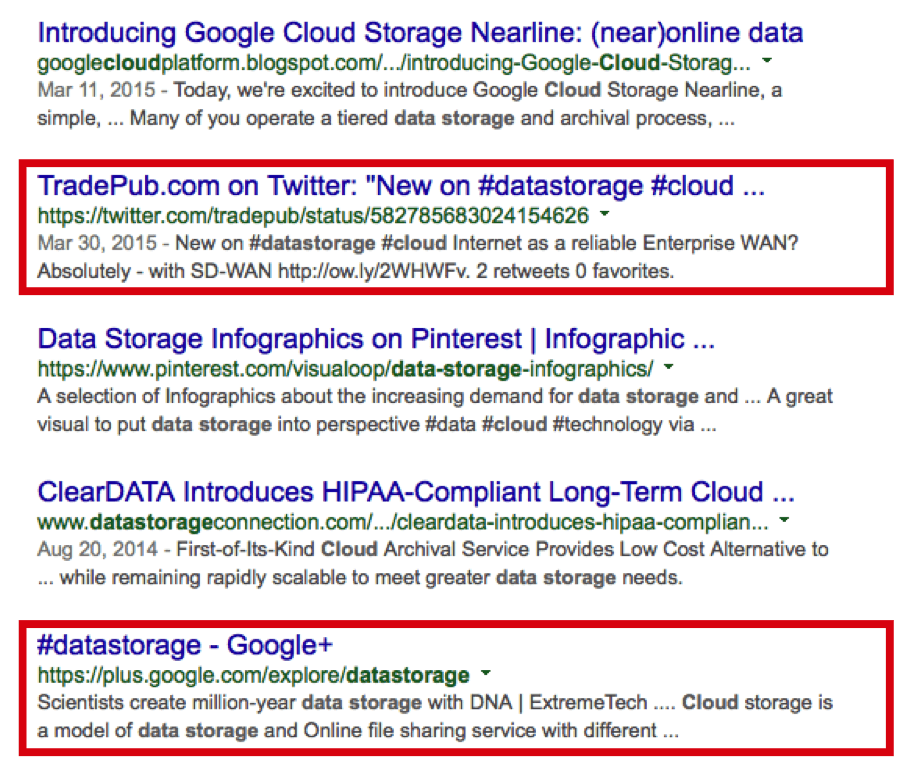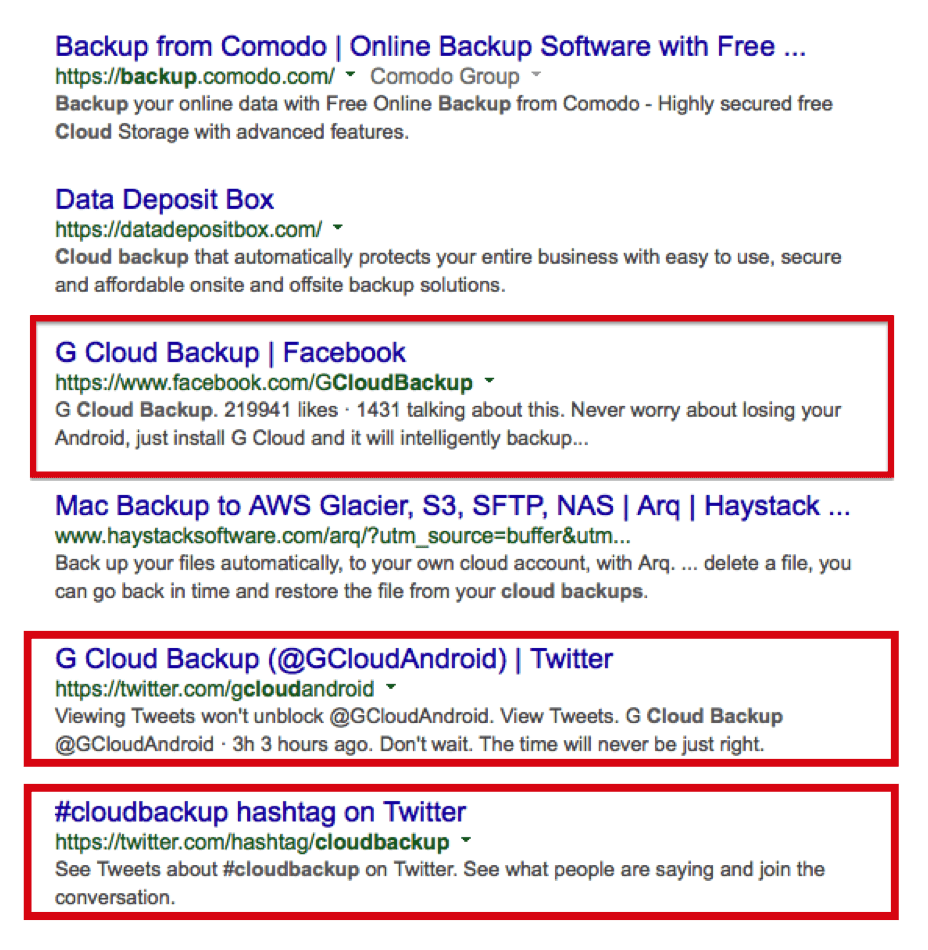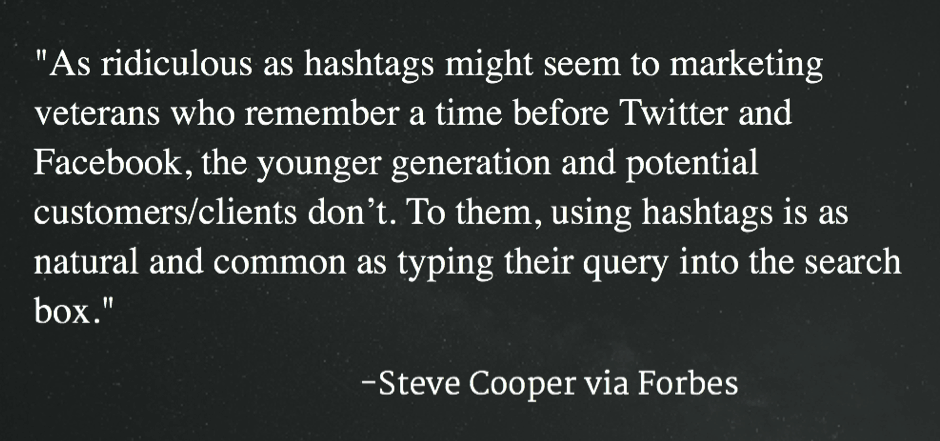Pop Quiz: Are you using hashtags in your online marketing campaign? If you answered yes, do you know why they are important? And do you know how they relate, if at all, to the SERP?
If you’ve passed over the hashtag because you view it as a fad, it’s time to revisit the concept. If you randomly add hashtags to your social posts as if you’re adding a dash of salt to your fries, it’s time to add some strategy to your hashtag game.
Just consider these stats from Social Media Today writer Pam Dyer:
“Only 24% of tweets include hashtags, but those that do receive twice the engagement of those without them. When used well, hashtags can be powerful tools that drive brand recognition, increase reach, build community, create buzz, and positively impact customer loyalty.”
Dyer is referring to hashtag usage on Twitter, but what about the almighty SERP? Can hashtags help a brand gain visibility for trending topics on Page 1 of Google or Bing? Yes, they can. Read on to get the straight facts about hashtags and the SERP.
Google+ Is Still A Relevant SERP Ally
While Google+ has the lame duck reputation for social media marketing, ignoring it is a poor choice, especially when it comes to posts showing up in the SERP. When Google Authorship was eliminated in mid-2014, many brands abandoned G+. That was a premature move. Just because Authorship is no longer supported in web search, this does not mean that G+ posts have disappeared as well, especially when it comes to hashtag searches.
Danny Sullivan from Search Engine Land touched on this topic and called it Author Rank.
What is it? G+ posts from trusted authors are still showing up in the SERP. Combine a related hashtag, and posts from other social channels and key influencers can appear as well. Let’s look at an example:
Search Query: #datastorage cloud
Organic Results:
The first social listing (which is the second item shown) is a tweet, and the fifth listing is a link to the Google hashtag search tool. Google has gathered everyone who is talking about that particular hashtag and has displayed them in one listing. If your brand is striving for relevance within a certain niche, wouldn’t it make sense to add a relevant hashtag to your content?
Do these results show up if you omit the hashtag from the search query? No, there are zero social links.
Search Query: datastorage cloud
Results without Hashtag:
A recent post from Ann Smart of Social Media Examiner outlined the value of Google+ posts with hashtags. Unlike other hashtag-enabled sites like Twitter, G+ actually curates content related to your posts. What that means is that they’ll serve up your posts in related searches. As Smart reinforces in her post, “It’s the additional related results that set Google+ hashtags apart.”
Your simple takeaway here is even if Authorship is dead, G+ should not be ignored. Use it, embrace it, and love it, especially combined with the use of hashtags.
Effective Hashtags Across Multiple Social Channels Can Improve Brand Visibility
One of Google’s most important factors for higher page ranking comes in the form of “the conversation.” This conversation is how people are connecting, discussing, and interacting with your brand. This factor comes in the form of the online currency of shares, tweets, +1s, likes, etc.
You can improve your own relevance in these conversations by embracing the hashtag. Even though this sounds like we’re beating a dead horse, don’t neglect the hashtag. Even Google has listed the hashtag as a search operator for improving results. Adding a hashtag strategy to your campaign will improve visibility for your brand, from Google to Twitter, Facebook, Instagram, and beyond.
Since our first search examples were dominated by Google and Amazon, let’s look at a keyword that gives other brands a chance.
Search Query: cloud #backup
Organic Results:
Three of the top six results are social channels. As it gets harder and harder to achieve Page 1 results, perhaps it’s time to pay attention to WHO is showing up there, and build a relationship with them.
Remember the advice that came out after Google launched Penguin and Hummingbird? “Don’t guest post for links, guest post for an audience.” If your brand submitted a guest post for an authoritative source related to a specific hashtag, the value in the post would supersede “link juice” if their tweet reached Page 1, and the tweet linked to your post or your website.
Again, do results vary when the hashtag is dropped from the query? Yes, social links disappear, again.
Search Query: cloud backup
Results without Hashtag:
Hashtags Make Your Brand A Bigger Part Of The Conversation
Using hashtags isn’t just about creating your own and hoping other people will catch on. It’s also about connecting with trends already present within the online and social media world and resonating with your own customer base or audience.
Search Engine Journal contributor Olga Andrienko brings this point home in a post she recently wrote:
“Using hashtags correctly makes you appear on-trend and tuned into current events. In other words, hashtags make you look relevant to your social media followers, and relevance is what makes them stick around.”
Hashtags and Google+: Your Ally To A Better SERP Result
The simple fact is that the more people talk about your company or brand, the better your ranking will get. Unifying your marketing campaign across social media using hashtags as the glue will bring it all together.
Your hashtag strategy should always start with Google+. Google explore tool gives you direct insight into topics and areas that are related to your most relevant industry topics. You’ll get a better understanding of what is being talked about online and how to be a better participant in that conversation. That connection will always get more people interacting with your brand online, give you insight on relevant groups that have captured your target audience, and contribute to your company’s inevitable ranking power.
Are People Searching With Hashtags In The Search Engines?
Google announced “a richer hashtag experience” for Google Search back in 2013, via Zaheed Sabur. Search Engine Land quickly followed up with an announcement of “hashtag search.” Kevin Lee from Buffer nailed it when he highlighted a quote from Steve Cooper on Forbes.com.
The hashtag. It’s time for marketers to use it and gain momentum over competitors who are still ignoring it and treating it as a fad.
About the Author: Markelle Harden serves as chief content manager at Get A Copywriter and creates Resources for businesses that are chipping away at their content goals. Follow her @getacopywriter.





No comments:
Post a Comment